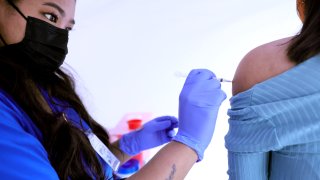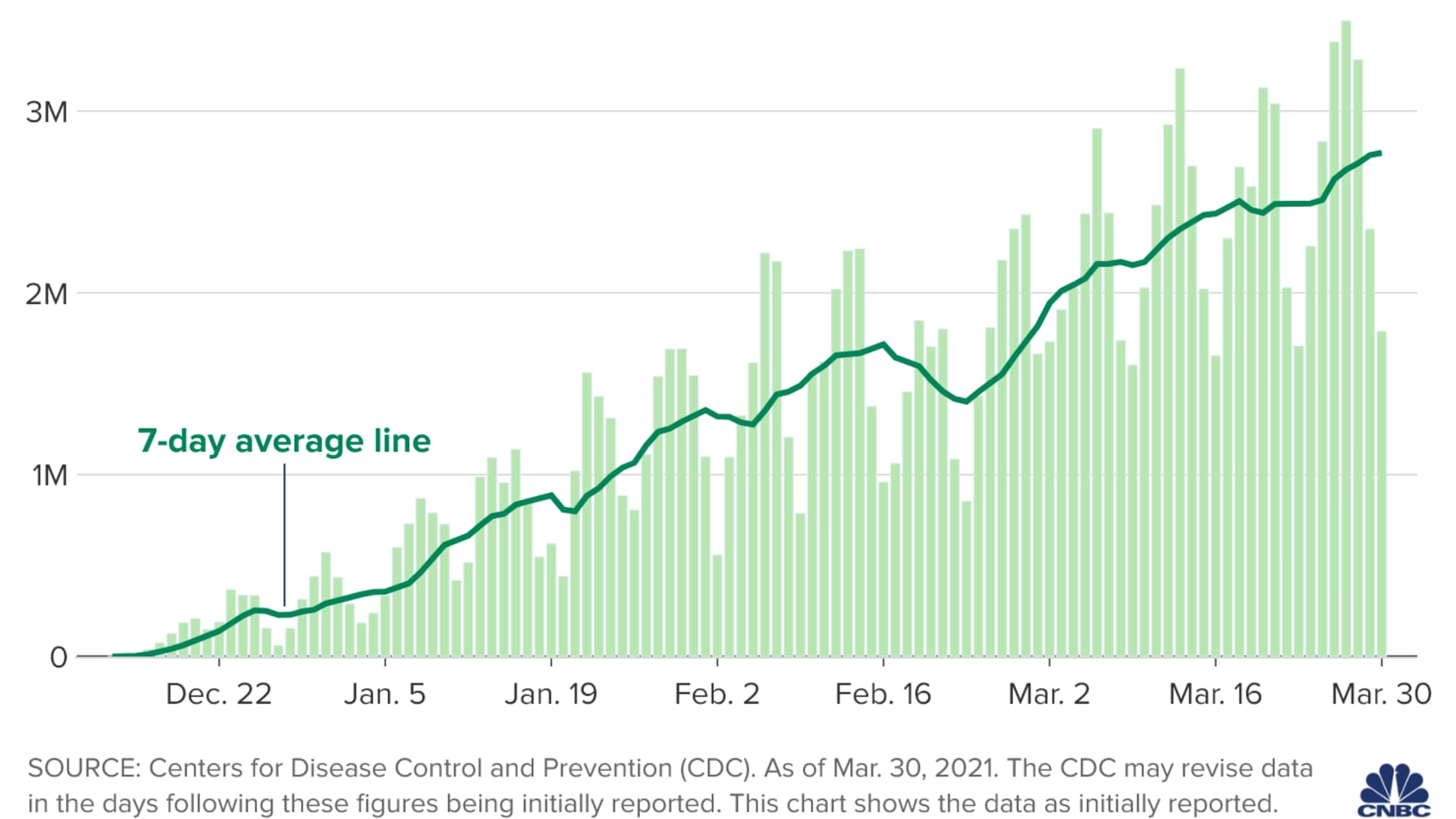
- The United States' Covid-19 cases are trending upward again, with nationwide infection levels far below January's peak of about 250,000 new cases per day but approaching numbers seen during the summer surge when average daily case counts reached nearly 70,000.
- In an effort to speed up the vaccination campaign, many states are expanding eligibility guidelines for who qualifies to get a shot.
- The seven-day average of daily Covid-19 vaccine shots given in the U.S. reached 2.8 million on Tuesday.
The United States' Covid-19 cases are trending upward again, with nationwide infection levels far below January's peak of about 250,000 new cases per day but approaching numbers seen during the summer surge when average daily case counts reached nearly 70,000.
In an effort to speed up the vaccination campaign, many states are expanding eligibility guidelines for who qualifies to get a shot. Dr. Scott Gottlieb, a former Food and Drug Administration commissioner, said Wednesday on CNBC's "Squawk Box" that the initial period of expanded eligibility may leave some Americans frustrated.
"Some states are willing to make a broader population eligible to be vaccinated and tolerate the fact that the first two or three weeks of that are going to be messy," Gottlieb said. "Once a state opens eligibility wide open, a lot of people are going to complain that they're going onto the website and can't get an appointment. It's going to take a couple weeks to work that excess demand off."
Get top local stories in Southern California delivered to you every morning. Sign up for NBC LA's News Headlines newsletter.
U.S. Covid cases
About 66,800 daily new coronavirus cases are being reported in the U.S., based on a seven-day average of data from Johns Hopkins University. That figure has been trending upward, raising concerns about a potential "fourth wave" of infections.

U.S. Covid deaths
The daily death toll has fallen significantly from its winter peak but remains elevated at nearly 1,000 per day, based on a weekly average of Hopkins data. Since the start of the pandemic, more than 550,000 Covid deaths have been reported in the U.S., more than any other country.

The vaccine rollout may be a reason for optimism on this front. If the most vulnerable populations of Americans are protected, the death toll may not rise as significantly as it has during prior periods of case count increases.
Money Report
U.S. vaccine shots administered
As more states expand eligibility rules for who can receive a vaccine — President Joe Biden said Monday that 90% of adults in the U.S. will be eligible for shots by April 19 — the daily pace of vaccinations continues to rise.
Following 1.8 million reported vaccine doses administered Tuesday, the seven-day average of shots given in the U.S. reached 2.8 million.

Some hesitancy around getting the vaccine may be waning. The latest Vaccine Monitor survey from the Kaiser Family Foundation showed a decrease in respondents saying they want to "wait and see" about getting the vaccine, with 17% of respondents selecting that answer in March compared with 39% in December.
However, 13% of respondents in March said they would "definitely not" get a vaccine and 7% said they would get only one if required for work, school or other activities.
U.S. share of the population vaccinated
Nearly 30% of the U.S. population has received at least one dose of vaccine, according to Centers for Disease Control and Prevention data, and 16% of the population is fully vaccinated.

On Wednesday morning, Pfizer said its Covid-19 vaccine was 100% effective in a study of adolescents aged 12 to 15.
Disclosure: Scott Gottlieb is a CNBC contributor and is a member of the boards of Pfizer, genetic testing start-up Tempus, health-care tech company Aetion Inc. and biotech company Illumina. He also serves as co-chair of Norwegian Cruise Line Holdings' and Royal Caribbean's "Healthy Sail Panel."






